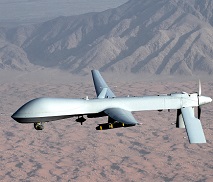
Inside the Devastation of America’s Drone Wars
Source: Tom Dispatch
In a trio of recent action-packed movies, good guys watch terrorists mingling with innocent women and children via real-time video feeds from halfway across the world. A clock ticks and we, the audience, are let in on the secret that mayhem is going to break loose. After much agonized soul-searching about possible collateral damage, the good guys call in a missile strike from a U.S. drone to try to save the day by taking out a set of terrorists.
Such is the premise of Gavin Hood’s Eye in the Sky, Andrew Niccol’s Good Kill, and Rick Rosenthal’s Drones. In reality, in Washington’s drone wars neither the “good guys” nor the helpless, endangered villagers under those robotic aircraft actually survive the not-so secret drone war that the Obama administration has been waging relentlessly across the Greater Middle East — not, at least, without some kind of collateral damage. In addition to those they kill, Washington’s drones turn out to wound (in ways both physical and psychological) their own operators and the populations who live under their constant surveillance. They leave behind very real victims with all-too-real damage, often in the form of post-traumatic stress disorder on opposite sides of the globe.


